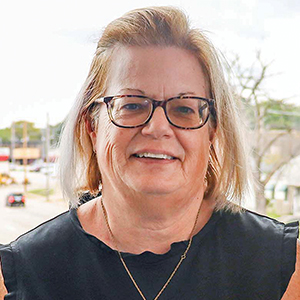Food Bank of Iowa volunteers fill individual bags of crackers from a bulk source.
Writer: Michael Crumb
“If you’re hungry you can’t concentrate. You don’t stand a fighting chance … and that just puts you behind the eight ball from the start if you don’t have proper food and nutrition.” —Brad Liggett, president of agribusiness at Nationwide Insurance.
Nationwide is one of several partners with the Food Bank of Iowa in the fight against food insecurity and hunger across Iowa, a fight that intensified as food insecurity reached record levels with the onset of the coronavirus pandemic in March 2020. Today, while some of that demand has diminished, the need remains high with at least 300,000 Iowans still experiencing food insecurity more than two years after the pandemic’s onset.
For Nationwide and others, food insecurity is more than just a problem that others in the community face. It’s a problem they tackle because those who face food insecurity can be your neighbors, your friends, your family, or your co-worker sitting in the next cubicle over or whose photo is above yours on a Zoom call.

“If there was ever a chance to make a call to the community that we have a need and a crisis on our hands, the pandemic brought that to light and everyone who’s engaged … whether it’s the food world or all nonprofits [they] are struggling to catch up, and then with rising costs of food and cutbacks to many supplemental programs,” said Brad Liggett, president of agribusiness at Nationwide Insurance. “The last two years have just been very difficult for food and all other nonprofits, but it really created a need, and folks who had never had a need for the food bank before found themselves in a situation where they had a need.”
For Nationwide and Liggett, food insecurity is an issue that the business community must engage with to ensure workers, not only at his company but across Iowa, can be as healthy and productive as possible if the state is to continue to recover from the pandemic.
And that approach can also help companies attract top talent as prospective employees are looking for companies that align with their values and moral compass, Liggett said.
Coming Together
If you speak to those on the front lines, the food insecurity fight is clearly a workforce issue that requires the attention of all sectors of the community. It is a symptom of the much larger issue of poverty. You can’t talk about food insecurity without addressing wages, housing and child care, they said.
Then there’s inflation and increases in the cost of food, housing and fuel, and in the expenses farmers pay to plant crops and raise livestock.

“All of us feel it, but most of us can absorb it,” said Michelle Book, the president and CEO of the Food Bank of Iowa. “People that live in poverty are not able to absorb those levels of increases. I think it’s something we all ought to be concerned with, but the business community needs to be concerned because they’re part of the problem.”
Book said the median monthly rent in Iowa is $1,057, so an annual income that is needed to support that is $42,280. She said many businesses, such as convenience stores, grocery stores and banks, are now paying $14 to $17 an hour. It would require an hourly wage of $20.32 to support the median rent in Iowa, Book said.
“If you’re making less than this, you’re cost-burdened,” she said. “You can’t meet your everyday living expenses. Not even the basics, the necessities.”
And that leaves many people struggling with decisions about which bill to pay and deciding between rent, utilities, medicine or groceries, Book said.

Matt Unger, CEO of the Des Moines Area Religious Council, which operates a network of 14 food pantries, mobile units and a warehouse in Central Iowa, said food insecurity often shows up in the workplace as reduced productivity and higher absenteeism.
“We know for adults with children, sometimes food insecurity looks like actually giving up meals so that children can eat,” he said. “So on the more severe side of hunger and food insecurity, where people are going without meals, or not really eating the right things because they can’t afford them or don’t have time to prepare things, I think that really can actually show up in workplaces in terms of decreased productivity.”
But focusing only on food insecurity without addressing the causes is shortsighted, Unger said.
“What we’re really talking about is poverty when we talk about food insecurity,” he said. “That ties in with a lot of other workforce issues we hear about, such as affordable housing, lack of affordable child care, and directly ties into those. Food insecurity doesn’t live in a bubble. It interacts with all these intersecting issues of poverty that leaders are now starting to recognize as workforce issues. And if you want to attract and retain employees, we need to be able to make sure they can live and thrive in our communities. That’s why food insecurity is a workforce issue, because it’s so intertwined with other things that affect people.”
Unger said a lot of his agency’s food pantry visitors are people who have jobs but are not making enough to support their families.
“There’s a good amount of people who make too much to qualify for SNAP and still need to use a food pantry to make ends meet,” he said. “There’s this idea that if you have a job you shouldn’t have any needs. That’s just not true. There’s people we provide assistance to that are working multiple jobs.”
He said the old idea that if someone works hard they will have enough is no longer true.
“It’s just not the reality,” Unger said. “We have not kept salaries at the same pace as costs. So the thing we have to figure out here is making sure here in the business community that we can pay people enough.”
Unger said it’s not necessarily that companies don’t want to pay more. “The rest of the system has to work for them to pay well, whether that comes down to health care costs and all those other things.”
The business community needs to rally around finding solutions to poverty, he said.
“We haven’t done that since the 1960s, honestly,” Unger said. “There’s tremendous leadership in the business community that could help make that happen … but this is a conversation that needs everybody involved, like the government, the nonprofit sector, the business sector. It’s not something that is easily solvable, and business has to be a big piece of what we do.”
He said every time the issue of increasing the minimum wage is raised, there’s an argument that the market will determine where wages need to be.
“That’s not happening,” Unger said. “There’s tens of thousands of people struggling to house themselves, feed themselves and take care of their kids. The market is not correcting for that, so we have to have that happen outside of the government, or we’ve got to start raising these wages.”
The other part of the solution is addressing costs and finding a way to balance that increase with wages, he said.
Shared Goals

Luke Lynch
“I think the business community has the same goals as our community in general, and that is for a thriving community,” said Luke Lynch, OpportUNITY director at United Way of Central Iowa. “In order to have a thriving community, we need to make sure that people are thriving.”
Lynch, like the others, said food insecurity is a symptom of poverty.
“If people are coming to work and expected to perform at a certain level, they should be set up for that, and that starts with not being food insecure with having all those pieces in place in their life so when they show up they can be present,” he said.
If people aren’t able to show up and be present for a variety of reasons, then the community isn’t thriving and work needs to be done to remove those barriers, Lynch said.
“If people are concerned about their food, or where they live or any list of things, then they’re not going to be able to show up,” he said. “It is a business concern. … As a society, if we’re not taking care of these barriers and the system changes that need to happen on the front end, we’re going to pay for it later.”
A Possible Disconnect
Is there a disconnect? The short answer is maybe, experts said.
One example is employers not understanding how wages they pay an employee can affect the person and their families.
For example, a United Way report shows that for a family of four to be self-sustaining, they would need a household income of about $57,000 a year. While that may look fine on paper, Lynch said it’s not what it seems.
“The more we have that conversation the better,” he said. “People may live in the suburbs, get in their car in the garage, drive downtown, maybe stop at a coffee shop, drive to a downtown parking basement and take an elevator up to their office and they haven’t seen the working poor. They haven’t had to.”
Lynch said employers may not always know the circumstances within the family of an employee, and while one employee making $18 may be fine, another may be struggling.
“Wages are just a piece of the pie,” Lynch said. “Are we being flexible? There are just those types of things that employers can do, not just raising wages but what other supports can be provided to an employee to provide continuity to their life and help be a part of the solution.”
Book, the president and CEO of the Food Bank of Iowa, said she doesn’t know if there is a disconnect. There are many CEOs and company leaders in the community who are caring, compassionate and who work to make a difference, she said.
But she acknowledges that conditions in the marketplace continue to erode a family’s ability to cover their basic costs.
She said the poorest 20% of Americans receive $9,500 per person per year in government benefits for a total of about $130 billion a year.
“Meanwhile the profits of selling a low-cost service or widget are going into the pockets of shareholders,” she said. “So by keeping salaries low we keep prices low, which benefits consumers and it benefits the people that own these companies. And you and I subsidize that, so I think we all should care about that.”
Food Insecurity Affects Everyone
Liggett, from Nationwide, said it’s important for everyone in the business community to understand the scope of the food insecurity problem and to become engaged in the issue with a goal of making a difference.
Nationwide, which sends volunteers to the Food Bank of Iowa at least one day a month, has raised its minimum wage to $21 an hour. It also has a program where employees can contribute to a fund that other employees can apply to for help if they are struggling. The Associates Helping Associates program, which also receives funding from the Nationwide Foundation, has provided over $1 million to associates in need, Ligget said.
He mentions that as an example of not only something companies can do to help, but also to illustrate how wide-reaching the food insecurity problem can be.
“Food insecurity affects everyone,” he said. “It affects all ages, all socioeconomic spectrums. These are hardworking adults, children, families, seniors who just simply can’t make ends meet. As a business community, these are our workers. These are our prospective workers. These are our prospective clients. So as the community health in keeping itself food secure goes, it really helps the overall community thrive.”
Turning Talk Into Action
What you can do to help in the fight against food insecurity
Writer: Michael Crumb
The topic of food insecurity has been thrust into the spotlight as a result of the coronavirus pandemic, which nearly doubled the number of Iowans who were struggling during the early months of the pandemic. Today, there are still more than 300,000 Iowans experiencing food insecurity.
What exactly can businesses do to fight food insecurity and help make sure their employees and the community where they live can thrive?
Several people in the nonprofit and business sector provided ideas ranging from big and bold to small and simple.
Here is what we learned:
Raise wages. With the median rent in Iowa topping $1,000 and with other costs, such as food and fuel increasing, employees’ wages haven’t kept up, leaving them struggling to make ends meet.
Get involved. Give employees paid time to volunteer at food banks and food pantries so they can see the need — and those who are seeking help — firsthand.
Give funds. With the increasing costs of food, food banks and pantries need help keeping their shelves stocked with items beyond those that are donated, and extra money can help them better achieve their mission.
Hold events. Provide opportunities for employees to learn more about what the company is doing and how they can get involved.
Establish programs. Let employees be part of the solution. Create opportunities for them to donate to help co-workers who may be struggling.
Know your employees. Get to know them so you can better recognize when they might be struggling.
Create a culture. Make your office an environment where issues such as food insecurity can be openly discussed and employees feel comfortable coming forward to their leaders if they are experiencing challenges.
Advocate. Do more to make child care more affordable for employees, helping to free up more of a family’s income to cover other costs, such as food, housing and health care.
Continue learning. Don’t stop educating yourself about poverty-related issues and how they affect each other. You can’t just focus on food insecurity and call it good. As Luke Lynch, OpportUNITY director at United Way of Central Iowa, said, “You can’t do one without the other. It’s whack-a-mole.”
We asked employees of Ascentra Credit Union in the Quad Cities about their experiences volunteering at River Bend Food Bank. Here is some of what they had to say.

Sydney Damewood
Teller, Ascentra Credit Union, Davenport
Why should someone volunteer at a local food pantry? It’s fun, free, and feels good to help your community.
Why is it important for the business community to become engaged and work to help those experiencing food insecurity? It’s important for the business community to get involved because it can provide a deeper understanding of what the community needs, and how to best aid them in getting what they need.

Amanda Alatorre
Accounting Operations Associate, Ascentra Credit Union, Bettendorf
Why is it important for the business community to become engaged in finding solutions to food insecurity? I think no one deserves to go to bed hungry and if you can help them out in any way, no matter large or small it is very much appreciated, especially by the children. Local businesses should be stepping up and making the community aware of the issues some are facing daily and offering a better understanding all while hopefully getting others in the community to follow along and get their offices and employees eager to volunteer and help as well.
Why should someone volunteer at a local food bank or pantry? Try it because once you do you will want to continue helping in any way, shape, or form you can. You will never regret the feeling of making a difference to someone and making them smile knowing they can forget their issues even if it’s just for a quick second.

Jason Ockerman
Branch Operations Trainer, Ascentra Credit Union, Bettendorf
What have you learned about food insecurity by volunteering? That it does not matter where you come from or your background, it is always possible you are struggling to find the next meal.
Why is it important for the business community to become engaged and work to help those experiencing food insecurity?The business wouldn’t be a business without the community so in return I think it is our responsibility to help those in need because you never know when you could be in their shoes, and you would hope that someone is looking out for you as well.

Kathy O’Haver
Member Solution Specialist, Ascentra Credit Union, Bettendorf
What have you learned about food insecurity by volunteering? It really opened my eyes to those not having food to eat and I felt sad for them too.
Why is it important for the business community to become engaged and work to help those experiencing food insecurity? To get more information out to everyone and more help for them.












